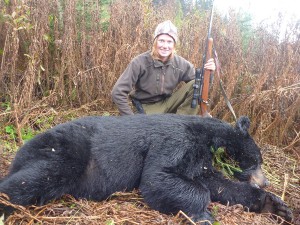HSUS Declares Maine Bear Hunting a Target in 2016
Just months after a resounding defeat by Maine voters, the Humane Society of the United States (HSUS) has announced plans to bring yet another ballot issue on bear hunting back to Maine.
On Tuesday, Feb. 24, lawyers for HSUS and the state of Maine were in court to debate the lawsuit brought by HSUS against the Department of Inland Fisheries and Wildlife. That suit sought to stop the state’s wildlife experts from explaining to voters the true dangers of HSUS’s bear hunting ban. Despite an overwhelming decision by Maine Superior Court Justice Joyce Wheeler that sided with the state’s right to provide comments, HSUS continues to pursue a legal challenge.
As part of the discussions about the pending litigation, an attorney for HSUS, Rachel Wertheimer, advised the court that they will again put the question on the 2016 ballot, and will be filing the initial paperwork soon. Read more



 Gene Lumsden, CEO of Legacy Sports International, Inc. is proud to announce the addition of a new line of semi-auto shotguns from Pointer. The New Pointer Semi-autos are a family of gas actuated shotguns in Turkish walnut or a beautiful gray laminate. The walnut models come in 12, 20 and 28 gauges, while the gray laminate is available as a 12 gauge. All have 28 inch barrels, a 5+1 magazine capacity and a magazine cut-off for qiuck load changes. All four shotguns come with fiber optic front sights. Each Pointrer Semi-auto has five interchangeable chokes in F, M, IM, IC and CL constrictions.
Gene Lumsden, CEO of Legacy Sports International, Inc. is proud to announce the addition of a new line of semi-auto shotguns from Pointer. The New Pointer Semi-autos are a family of gas actuated shotguns in Turkish walnut or a beautiful gray laminate. The walnut models come in 12, 20 and 28 gauges, while the gray laminate is available as a 12 gauge. All have 28 inch barrels, a 5+1 magazine capacity and a magazine cut-off for qiuck load changes. All four shotguns come with fiber optic front sights. Each Pointrer Semi-auto has five interchangeable chokes in F, M, IM, IC and CL constrictions. 



 The Limb Shaker Calling Kit contains the new Limb Shaker Friction Call and Limb Shaker Owl Hooter. The Limb Shaker Friction Pot Call has a ready to play pre-sanded glass surface and comes with a Green Mountain camo striker. It easily produces all the sounds of a hen turkey, including high-pitched yelps and cuts.
The Limb Shaker Calling Kit contains the new Limb Shaker Friction Call and Limb Shaker Owl Hooter. The Limb Shaker Friction Pot Call has a ready to play pre-sanded glass surface and comes with a Green Mountain camo striker. It easily produces all the sounds of a hen turkey, including high-pitched yelps and cuts.